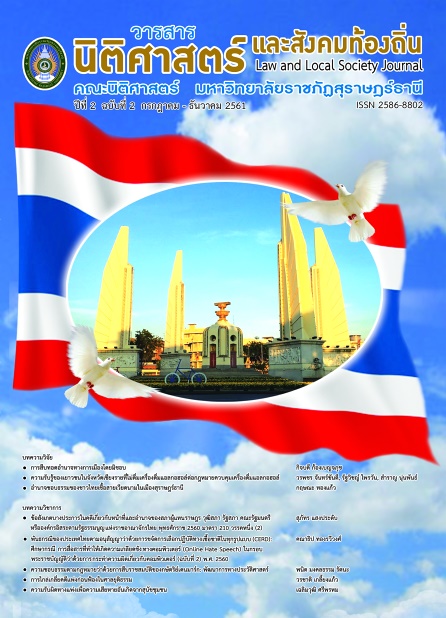ข้อสังเกตบางประการในคดีเกี่ยวกับหน้าที่และอำนาจของสภาผู้แทนราษฎร วุฒิสภา รัฐสภา คณะรัฐมนตรี หรือองค์กรอิสระตามรัฐธรรมนูญ แห่งราชอาณาจักรไทย พุทธศักราช 2560 มาตรา 210 วรรคหนึ่ง (2)
คำสำคัญ:
หน้าที่และอำนาจ, คำวินิจฉัยและคำสั่ง, องค์กรตามรัฐธรรมนูญ, รัฐธรรมนูญ แห่งราชอาณาจักรไทย พุทธศักราช 2560บทคัดย่อ
บทความวิชาการนี้ เป็นการศึกษาวิเคราะห์ประเด็นปัญหาในคดีเกี่ยวกับหน้าที่และอำนาจของสภาผู้แทนราษฎร วุฒิสภา รัฐสภา คณะรัฐมนตรี หรือองค์กรอิสระตามรัฐธรรมนูญแห่งราชอาณาจักรไทย พุทธศักราช 2560 มาตรา 210 วรรคหนึ่ง (2) เพื่อมีข้อสังเกตบางประการเกี่ยวกับผู้มีสิทธิเสนอเรื่องและเงื่อนไขในการใช้สิทธิต่อศาลรัฐธรรมนูญ
จากการศึกษาพบว่า รัฐธรรมนูญฉบับปัจจุบันได้กำหนดให้องค์กรตามรัฐธรรมนูญที่มีสิทธิเสนอเรื่องต่อศาลรัฐธรรมนูญไว้ชัดเจนกว่ารัฐธรรมนูญฉบับที่ผ่านมา แต่อย่างไรก็ตาม อาจมีประเด็นปัญหาเกี่ยวกับการใช้หน้าที่และอำนาจของคณะกรรมการสรรหาองค์กรตามรัฐธรรมนูญซึ่งเป็นส่วนย่อยขององค์กรดังกล่าวที่รัฐธรรมนูญฉบับปัจจุบันและพระราชบัญญัติประกอบรัฐธรรมนูญว่าด้วยวิธีพิจารณาของศาลรัฐธรรมนูญ พ.ศ. 2561 ไม่ได้กำหนดรายละเอียดไว้ แต่หากเปรียบเทียบกับกฎหมายพื้นฐานของสหพันธ์สาธารณรัฐเยอรมนีและรัฐบัญญัติว่าด้วยศาลรัฐธรรมนูญแห่งสหพันธ์ ค.ศ. 1951 ได้กำหนดให้ ปัญหาการใช้อำนาจขององค์กรส่วนย่อยขององค์กรตามรัฐธรรมนูญที่ก่อตั้งขึ้น ตามรัฐธรรมนูญโดยตรงที่เข้าไปมีส่วนร่วมในการใช้อำนาจรัฐ สามารถเสนอเรื่องให้ศาลรัฐธรรมนูญวินิจฉัยได้ อีกทั้งยังได้กำหนดอายุความและรายละเอียดเงื่อนไขต่าง ๆ ในการใช้สิทธิไว้ในกฎหมายอย่างชัดเจน ซึ่งรัฐธรรมนูญและกฎหมายดังกล่าวของประเทศไทยไม่ได้กำหนดอายุความไว้ อีกทั้งกำหนดเงื่อนไขการใช้สิทธิบางกรณีไว้เท่านั้น
ผู้เขียนเห็นว่า ผู้มีสิทธิเสนอเรื่องและเงื่อนไขในการใช้สิทธิต่อศาลรัฐธรรมนูญ สามารถกำหนดรายละเอียดไว้ในข้อกำหนดของศาลให้ชัดเจนขึ้นได้ ส่วนประเด็นเนื้อหาแห่งคดีเกี่ยวกับปัญหาการใช้หน้าที่และอำนาจขององค์กรตามรัฐธรรมนูญ สามารถนำแนวคำวินิจฉัยและคำสั่งของศาลรัฐธรรมนูญเพื่อเทียบเคียงประกอบการพิจารณาวินิจฉัยของศาลรัฐธรรมนูญได้ภายใต้บริบทของรัฐธรรมนูญฉบับปัจจุบัน
เอกสารอ้างอิง
2. Bundesministerium der Justiz und fur Verbraucherschutz [Online]. Available from: https://www.gesetze-iminternet.de/englisch_gg/englisch_gg.pdf. Retrieved 26 October 2018.
3. Bundesverfassungsgericht [Online]. Available from: https://www.Bundesverfassungs
gericht.de/SharedDocs/Downloads/EN/Gesetze/BVerfGG.pdf?blob=publicationFile&v=2 Retrieved 26 October 2018.
Federal Constitutional Court Act. 1951 (Bundesverfassungsgerichtsgesetz - BVerfGG)
4. H. Simon. 1994. Handbuch des Verfassungsrechts der Bundesrepublik Deutschland. Verfassungsgerichtsbarkeit. nBenda/Nathofer/Vogel
5. The Select Committee for Political Reform. National Legislative Assembly. 2007. Opinion Report on the Draft Constitution of the Kingdom of Thailand B.E. .... Bangkok: Bureau of the Senate Secretariat 1 Acting Secretary-General of the National Legislative Assembly
6. The Select Committee for Record of Intension, Archives and Minutes, Constitution Drafting Committee. 2007. Intension of The Constitution of the Kingdom of Thailand B.E. 2550. Bangkok: Commissioner 3. Office of the Secretary of the House of Representatives.
7. The Constitutional Court of the Kingdom of Thailand [Online]. Available from: https://www.constitutionalcourt.or.th/occ_web/download/article /article20180223095050.pdf Retrieved 26 October 2018.
8. Singkanetthi Bancherd. 2012. Basic Principal of The Constitution Concerning the Judiciary and the Federal Constitutional Court of Germany; Seminar handbook title "The role of the Constitutional Court and the German society" organized by the Institute for Policy Studies. Konrad Adenauer Foundation. in collaboration with the Faculty of Law.
9. National Institute of Development Administration
10. Krua-ngam, Visanu. 1987. Constitution Law. 3rd Edition Bangkok: Nithibunakarn.
11. Office of the Constitutional Court. 2012. Basic Law of the Federal Republic of Germany. Bangkok: P. Press Co., Ltd.
12. The Constitutional Court Decision 2/2541 (1998)
13. The Constitutional Court Decision 3/2541 (1998)
14. The Constitutional Court Decision 6/2542 (1999)
15. The Constitutional Court Decision 7/2542 (1999)
16. The Constitutional Court Decision 58-62/2543 (2000)
17. The Constitutional Court Decision 63/2543 (2000)
18. The Constitutional Court Decision 38/2545 (2002)
19. The Constitutional Court Decision 6/2546 (2003)
20. The Constitutional Court Decision 18/2546 (2003)
21. The Constitutional Court Decision 19/2546 (2003)
22. The Constitutional Court Decision 33/2546 (2003)
23. The Constitutional Court Decision 44/2547 (2004)
24. The Constitutional Court Order 40/2551 (2008)
25. The Constitutional Court Order 23/2553 (2010)
26. The Constitutional Court Order 1/2561 (2018)
ดาวน์โหลด
เผยแพร่แล้ว
รูปแบบการอ้างอิง
ฉบับ
ประเภทบทความ
สัญญาอนุญาต
บทความที่ได้รับการตีพิมพ์ในวารสารนิติศาสตร์และสังคมท้องถิ่น คณะนิติศาสตร์ มหาวิทยาลัยราชภัฏสุราษฎร์ธานี ถือเป็นลิขสิทธิ์ของวารสาร ทั้งนี้ ข้อมูล เนื้อหา และข้อคิดเห็นที่ปรากฏในบทความเป็นความรับผิดชอบของผู้เขียนแต่เพียงผู้เดียว กองบรรณาธิการไม่มีความจำเป็นต้องเห็นด้วยหรือร่วมรับผิดชอบใด ๆ
เนื้อหา ข้อมูล รูปภาพ และองค์ประกอบอื่น ๆ ที่ได้รับการตีพิมพ์ในวารสารฯ อยู่ภายใต้ลิขสิทธิ์ของวารสารนิติศาสตร์และสังคมท้องถิ่น การนำไปเผยแพร่ ดัดแปลง หรือใช้ประโยชน์ในลักษณะใด ๆ ไม่ว่าเป็นบางส่วนหรือทั้งหมด ต้องได้รับอนุญาตเป็นลายลักษณ์อักษรจากวารสารก่อน


